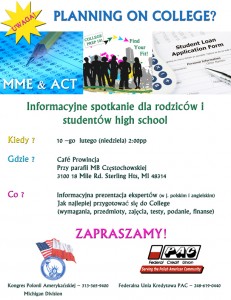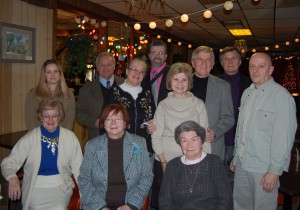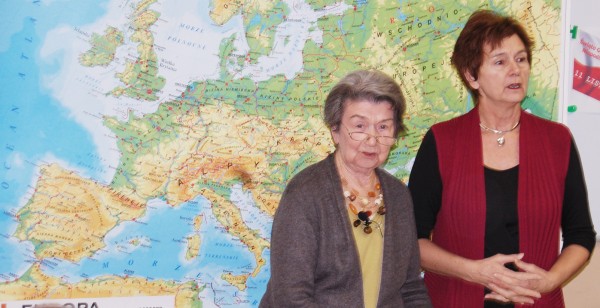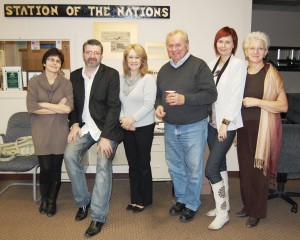On Saturday, March 23, the Installation Ceremony of the Officers and Directors of the Polish American Congress Michigan Division (PAC-MI) took place. The event was held at the Polish National Alliance Council 122 Banquet Hall in Hamtramck.
The program, of which Sebastian Szczepanski was Master of Ceremonies, also included the presentation of PAC-MI Awards to outstanding Polish-American individuals and organizations.
The election of PAC-MI officers and directors were held Saturday, March 16. Mariusz Szajnert was once again elected as the President for the two-year term.
Mary Ellen Tyszka, the chairwoman of the Installation Banquet, welcomed guests and expressed her gratitude to representatives of many other Polish American organizations present at the banquet, including AmericanPolishCulturalCenter, Polish Century Club, Polish National Alliance, Polish American Veterans Association, Polish Scouting Organization, and many others.
Szczepanski in his opening remarks reminded the crowd that less then six months after the national PAC organization was founded (in May of 1944), the Michigan Division held its first meeting. Its first president was Thaddeus Machrowicz (later congressman and federal judge). He was followed by Jan Kania, Joseph Skutecki, Victor Targonski, Bruno Stachura, Barney Chamski, Dr Alfred Sokolowski, Kazimierz Olejarczyk i Paul C. Odrobina.
The banquet was attended by many elected officials, including State Senator Steve Bieda, State Representatives Martin Howrylak and Rose Mary Robinson, US. Congressman Kerry Bentivolio, Hamtramck Mayor Karen Majewski.
The National President of Polish American Congress was not able to attend but he sent the letter congratulating the newly elected officers of PAC-MI. “The Michigan Division of the Polish American Congress has always been active and true example of Polish patriotism. I am sure the spirit will continue,” Spula wrote. Two more congratulatory letters were read at the banquet. Consul General of the Republic of Poland in Chicago, Paulina Kapuœciñska wrote in hers of a “crucial role which the Polish American Congress has been playing in Michigan, a state with a large population of Poles and Polish Americans.” Michigan Governer Rick Snyder in his letter congratulated on “efforts to unify people of Polish ancestry all across Michigan”.
The main speaker of the Installation Banquet was Timothy Kuzma, the National President of the Polish Falcons of America. The Oath of Office for the newly elected PAC-MI officers and members of the board was conducted by Hon. Judge Paul Paruk.
As in previous years, special PAC-MI awards were presented to outstanding individuals and organization. This year’s list of honorees included: Polish Falcons of American, Holy Cross Polish National Catholic Church, Friends of Polish Art, Gen. K. Pulaski Polish School & Polish Alliance Dancers, Piast Institute, Polish Times newspaper, Ray Okonski & Suzanne Sloat, Mary Ellen Tyszka and Helena Zmurkiewicz. The awards were presented by members of the Installation Banquet organizing committee: Henrietta Nowakowski, Jerzy Rózalski, Barbara Lemecha, Anna Bankowska, Sebastian Szczepanski, Anna Huk-Glaeser, Mariusz Szajnert and Dr. Gena Jurek.
The event concluded with a brief message by the PAC-MI President, Mariusz Szajnert.
Congratulations to all honorees and best of luck to the newly elected officers and board members of the Polish American Congress Michigan Division.
(“Polish Times”)


![Beautiful_Christmas__Wallpaper__[by_rebecca2001]_263](https://www.pacmi.org/wp-content/uploads/2012/12/Beautiful_Christmas__Wallpaper__by_rebecca2001_263-300x168.jpg)


 The Polish American Congress (PAC) is a U.S. umbrella organization of Polish-Americans and Polish-American organizations. Its membership is composed of fraternal, educational, veterans, religious, cultural, social, business, and political organizations, as well as individuals.
The Polish American Congress (PAC) is a U.S. umbrella organization of Polish-Americans and Polish-American organizations. Its membership is composed of fraternal, educational, veterans, religious, cultural, social, business, and political organizations, as well as individuals.